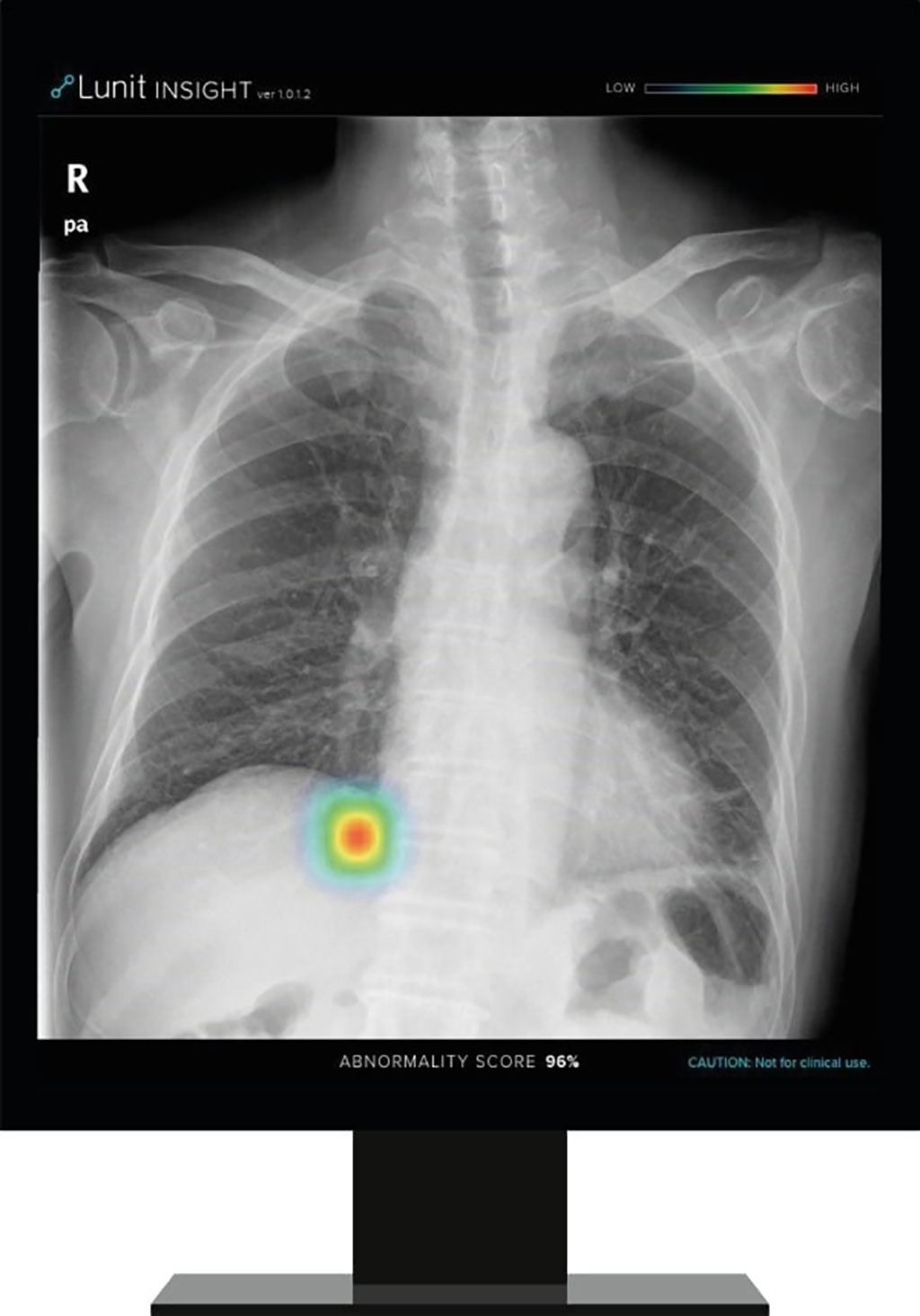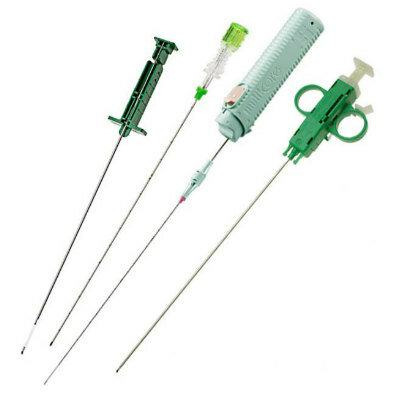New AI Software Accurately Detects Lung Cancers on X-Rays and Cuts Unnecessary Chest CT Scans by 30%
|
By HospiMedica International staff writers Posted on 06 Aug 2021 |

Illustration
A recent study has shown that a deep learning-based artificial intelligence (AI) algorithm can improve the performance of readers in detecting lung cancers on chest radiographs.
According to the second joint study conducted by Massachusetts General Hospital (Boston, MA, USA) and Lunit Inc. (Seoul, Korea), AI had 28% sensitivity benefit for radiology residents, helping them properly recommend CT exams for potential lung cancer patients, and 30% specificity benefit for radiologists in lung cancer detection, reducing unnecessary CT exams. The joint research team has previously focused on validating the accuracy of AI, and proved that Lunit INSIGHT CXR, an AI software for analyzing chest X-rays, can accurately detect malignant pulmonary nodules, which can cause lung cancer. In this consecutive study, the team focused on whether AI can affect the performance of medical professionals in finding lung cancers.
For the study, 519 images of cancer-positive and cancer-negative patients were selected from the National Lung Screening Trial (NLST). Eight readers, including three radiology residents and five board-certified radiologists, participated in the reading. By comparing the analysis of the readers and Lunit INSIGHT CXR, the result showed that AI could lead to more efficient and precise diagnosis for both doctors and patients. With AI, radiology residents were able to recommend 28% more chest CT examinations for patients who may have potential risk of lung cancer. Also, radiologists recommended about 30% lesser proportion of unnecessary chest CT examinations in cancer-negative patients.
"The use of AI could help to detect pulmonary nodules accurately with chest X-rays, as well as reduce the need for unnecessary chest CT exams in some patients," said Mannudeep K. Kalra, MD, a radiologist at the MGH and Co-investigator on the study. "This finding can benefit patients by enabling them to avoid unneeded radiation exposure, and it can benefit the healthcare system by preventing certain medical costs."
"Chest X-ray is the firsthand diagnostic tool to detect lung cancer, but it has limitations as it is a compressed 2D rendering of 3D human structures," said Brandon Suh, CEO of Lunit. "An accurate analysis through Lunit INSIGHT CXR can help medical professionals provide diagnosis to patients with increased efficiency - preventing potential cancer at an early stage, while saving time and cost for those who do not need a further examination."
Related Links:
Massachusetts General Hospital
Lunit Inc.
According to the second joint study conducted by Massachusetts General Hospital (Boston, MA, USA) and Lunit Inc. (Seoul, Korea), AI had 28% sensitivity benefit for radiology residents, helping them properly recommend CT exams for potential lung cancer patients, and 30% specificity benefit for radiologists in lung cancer detection, reducing unnecessary CT exams. The joint research team has previously focused on validating the accuracy of AI, and proved that Lunit INSIGHT CXR, an AI software for analyzing chest X-rays, can accurately detect malignant pulmonary nodules, which can cause lung cancer. In this consecutive study, the team focused on whether AI can affect the performance of medical professionals in finding lung cancers.
For the study, 519 images of cancer-positive and cancer-negative patients were selected from the National Lung Screening Trial (NLST). Eight readers, including three radiology residents and five board-certified radiologists, participated in the reading. By comparing the analysis of the readers and Lunit INSIGHT CXR, the result showed that AI could lead to more efficient and precise diagnosis for both doctors and patients. With AI, radiology residents were able to recommend 28% more chest CT examinations for patients who may have potential risk of lung cancer. Also, radiologists recommended about 30% lesser proportion of unnecessary chest CT examinations in cancer-negative patients.
"The use of AI could help to detect pulmonary nodules accurately with chest X-rays, as well as reduce the need for unnecessary chest CT exams in some patients," said Mannudeep K. Kalra, MD, a radiologist at the MGH and Co-investigator on the study. "This finding can benefit patients by enabling them to avoid unneeded radiation exposure, and it can benefit the healthcare system by preventing certain medical costs."
"Chest X-ray is the firsthand diagnostic tool to detect lung cancer, but it has limitations as it is a compressed 2D rendering of 3D human structures," said Brandon Suh, CEO of Lunit. "An accurate analysis through Lunit INSIGHT CXR can help medical professionals provide diagnosis to patients with increased efficiency - preventing potential cancer at an early stage, while saving time and cost for those who do not need a further examination."
Related Links:
Massachusetts General Hospital
Lunit Inc.
Latest AI News
- AI-Powered Algorithm to Revolutionize Detection of Atrial Fibrillation
- AI Diagnostic Tool Accurately Detects Valvular Disorders Often Missed by Doctors
- New Model Predicts 10 Year Breast Cancer Risk
- AI Tool Accurately Predicts Cancer Three Years Prior to Diagnosis
- Ground-Breaking Tool Predicts 10-Year Risk of Esophageal Cancer
- AI Tool Analyzes Capsule Endoscopy Videos for Accurately Predicting Patient Outcomes for Crohn’s Disease
Channels
Artificial Intelligence
view channel
AI-Powered Algorithm to Revolutionize Detection of Atrial Fibrillation
Atrial fibrillation (AFib), a condition characterized by an irregular and often rapid heart rate, is linked to increased risks of stroke and heart failure. This is because the irregular heartbeat in AFib... Read more
AI Diagnostic Tool Accurately Detects Valvular Disorders Often Missed by Doctors
Doctors generally use stethoscopes to listen for the characteristic lub-dub sounds made by heart valves opening and closing. They also listen for less prominent sounds that indicate problems with these valves.... Read moreCritical Care
view channel
Wheeze-Counting Wearable Device Monitors Patient's Breathing In Real Time
Lung diseases like asthma, chronic obstructive pulmonary disease (COPD), lung cancer, bronchitis, and infections such as pneumonia, rank among the leading causes of death worldwide. Traditionally, medical... Read more
Wearable Multiplex Biosensors Could Revolutionize COPD Management
Chronic obstructive pulmonary disease (COPD) ranks as the third leading cause of death worldwide. Acute exacerbations of COPD (AECOPD), which are often triggered by lung infections, accelerate the disease's... Read moreSurgical Techniques
view channel
Flexible Microdisplay Visualizes Brain Activity in Real-Time To Guide Neurosurgeons
During brain surgery, neurosurgeons need to identify and preserve regions responsible for critical functions while removing harmful tissue. Traditionally, neurosurgeons rely on a team of electrophysiologists,... Read more.jpg)
Next-Gen Computer Assisted Vacuum Thrombectomy Technology Rapidly Removes Blood Clots
Pulmonary embolism (PE) occurs when a blood clot blocks one of the arteries in the lungs. Often, these clots originate from the leg or another part of the body, a condition known as deep vein thrombosis,... Read more
Hydrogel-Based Miniaturized Electric Generators to Power Biomedical Devices
The development of engineered devices that can harvest and convert the mechanical motion of the human body into electricity is essential for powering bioelectronic devices. This mechanoelectrical energy... Read moreWearable Technology Monitors and Analyzes Surgeons' Posture during Long Surgical Procedures
The physical strain associated with the static postures maintained by neurosurgeons during long operations can lead to fatigue and musculoskeletal problems. An objective assessment of surgical ergonomics... Read morePatient Care
view channel
Surgical Capacity Optimization Solution Helps Hospitals Boost OR Utilization
An innovative solution has the capability to transform surgical capacity utilization by targeting the root cause of surgical block time inefficiencies. Fujitsu Limited’s (Tokyo, Japan) Surgical Capacity... Read more
Game-Changing Innovation in Surgical Instrument Sterilization Significantly Improves OR Throughput
A groundbreaking innovation enables hospitals to significantly improve instrument processing time and throughput in operating rooms (ORs) and sterile processing departments. Turbett Surgical, Inc.... Read more
Next Gen ICU Bed to Help Address Complex Critical Care Needs
As the critical care environment becomes increasingly demanding and complex due to evolving hospital needs, there is a pressing requirement for innovations that can facilitate patient recovery.... Read moreGroundbreaking AI-Powered UV-C Disinfection Technology Redefines Infection Control Landscape
Healthcare-associated infection (HCAI) is a widespread complication in healthcare management, posing a significant health risk due to its potential to increase patient morbidity and mortality, prolong... Read moreHealth IT
view channel
Machine Learning Model Improves Mortality Risk Prediction for Cardiac Surgery Patients
Machine learning algorithms have been deployed to create predictive models in various medical fields, with some demonstrating improved outcomes compared to their standard-of-care counterparts.... Read more
Strategic Collaboration to Develop and Integrate Generative AI into Healthcare
Top industry experts have underscored the immediate requirement for healthcare systems and hospitals to respond to severe cost and margin pressures. Close to half of U.S. hospitals ended 2022 in the red... Read more
AI-Enabled Operating Rooms Solution Helps Hospitals Maximize Utilization and Unlock Capacity
For healthcare organizations, optimizing operating room (OR) utilization during prime time hours is a complex challenge. Surgeons and clinics face difficulties in finding available slots for booking cases,... Read more
AI Predicts Pancreatic Cancer Three Years before Diagnosis from Patients’ Medical Records
Screening for common cancers like breast, cervix, and prostate cancer relies on relatively simple and highly effective techniques, such as mammograms, Pap smears, and blood tests. These methods have revolutionized... Read morePoint of Care
view channel
Critical Bleeding Management System to Help Hospitals Further Standardize Viscoelastic Testing
Surgical procedures are often accompanied by significant blood loss and the subsequent high likelihood of the need for allogeneic blood transfusions. These transfusions, while critical, are linked to various... Read more
Point of Care HIV Test Enables Early Infection Diagnosis for Infants
Early diagnosis and initiation of treatment are crucial for the survival of infants infected with HIV (human immunodeficiency virus). Without treatment, approximately 50% of infants who acquire HIV during... Read more
Whole Blood Rapid Test Aids Assessment of Concussion at Patient's Bedside
In the United States annually, approximately five million individuals seek emergency department care for traumatic brain injuries (TBIs), yet over half of those suspecting a concussion may never get it checked.... Read more
New Generation Glucose Hospital Meter System Ensures Accurate, Interference-Free and Safe Use
A new generation glucose hospital meter system now comes with several features that make hospital glucose testing easier and more secure while continuing to offer accuracy, freedom from interference, and... Read moreBusiness
view channel
Johnson & Johnson Acquires Cardiovascular Medical Device Company Shockwave Medical
Johnson & Johnson (New Brunswick, N.J., USA) and Shockwave Medical (Santa Clara, CA, USA) have entered into a definitive agreement under which Johnson & Johnson will acquire all of Shockwave’s... Read more














.jpg)
